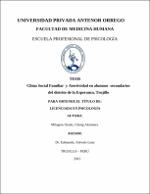Clima social familiar y asertividad en alumnos secundarios del distrito de la Esperanza, Trujillo

Ver/
Descargar
(application/pdf: 926.7Kb)
(application/pdf: 926.7Kb)
Fecha
2015Autor(es)
Chong Alcántara, Milagros Oyuki
Metadatos
Mostrar el registro completo del ítemResumen
El presente estudio analiza la relación entre el clima socio familiar y la conducta asertiva en alumnos secundarios, del distrito de La Esperanza, Trujillo. Se utilizó la escala del clima social familiar (FES) y el Autoinforme de Conducta Asertiva (ADCA-1). Se trabajó con 183 adolescentes del 3ro al 5to de secundaria. Para analizar de los datos se procedió a través de la fórmula producto momento de Pearson y corregidos con la de Spearman Browmn. Los datos relevantes son: Hay predominio de la Asertividad en los rangos medios. En cuanto a la percepción del clima socio familiar, es favorable en la dimensión de relaciones (cohesión y expresividad) y en conflicto tienden a ser negativo. Hay tendencia desfavorable en la dimensión desarrollo. En cuanto a la estabilidad, hay una tendencia favorable en la organización en tanto que en el área de control perciben negativamente. Así mismo hay correlación directa entre la conducta autoasertiva con las diferentes dimensiones del clima socio familiar, siendo estas más fuertes con relaciones, cohesión, expresividad, autonomía, actuación y estabilidad. Igualmente, la heteroasertividad se asocia directamente con las dimensiones de relaciones, desarrollo y estabilidad. This study analyzes the relationship between climate partner family and the assertive behavior in
adolescents of a secondary,
of La Esperanza, Trujillo. We used the scale of the social climate family (FES) and the self-assertive
behavior (ADCA-1). Working with 183 adolescents from the 3rd to 5th from secondary. To analyze the
data is then proceeded through the formula Pearson product moment and corrected with the Spearman
Browmn. Relevant data are: There is predominance of assertiveness in the mid-range. In regard to the
perception of the climate family partner, is favorable in the dimension of relations (cohesion and
expressiveness) and in conflict tend to be negative. There are unfavourable trend in the development
dimension. In terms of stability, there is a favorable trend in the organization as that in the control area
perceived negatively. Likewise there is direct correlation between the conduct autoasertiva with different
dimensions of the climate partner family, these being more strong relationships, cohesion,
expressiveness, autonomy, performance and stability. Equally, the heteroasertividad is directly associated
with the dimensions of relations, development and stability.
Palabras clave
Colecciones
- Psicología [571]

